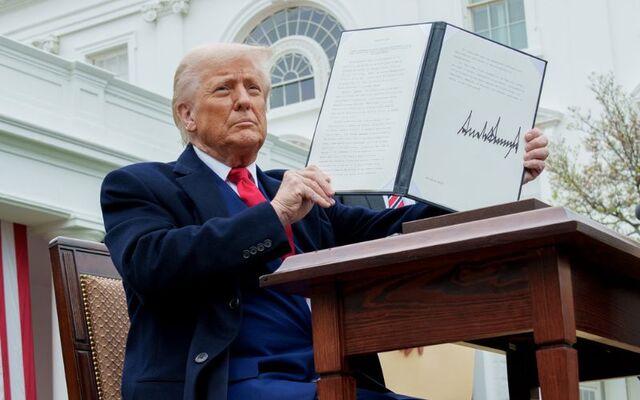Business leaders and economists agree that the negative effects of the blanket 20% US tariff on EU imports will be significant and have warned of a damaging trade war in prospect.
US President Donald Trump unveiled sweeping tariffs on Wednesday evening, including a global baseline global tariff of 10% and higher rates for territories like the EU and China (34%).
The 20% tariff on EU goods will take effect next Wednesday, April 9, and will affect sales of Irish-made alcohol, dairy, and machinery, among other products, but pharmaceutical exports will not be taxed.
Of the €72.6bn in Irish exports to the US last year, €44.4bn were classified as medicinal and pharmaceutical products, and Ireland is the European headquarters for American pharma giants like AbbVie, Pfizer, Lilly, MSD, and Bristol Myers Squibb.
Responding to the announcement, Ibec CEO Danny McCoy expressed deep disappointment and urged the government and the European Commission to act urgently to negotiate a solution with the White House.
"Government must also work with business to assess the potential consequences for the Irish economy resulting from the imposition of US tariffs and the likely EU response to these tariffs," he said.
"The government must advocate for a proportionate and measured EU response, informed by a detailed analysis of supply chains, strategic considerations, and the broader implications of any retaliatory measures."
Ibec anticipates that the new tariffs will result in a net overall export impact of around 2-3% in the short term but that Ireland is well-positioned to absorb slower growth and invest in diversifying market opportunities.
"To protect the economy and jobs we can draw on what worked in the Covid and Brexit measures. The most important domestic response is to support enterprises most affected by the tariffs," McCoy continued.
"This should include time-bound short-time working supports to help keep employees connected to businesses experiencing demand shocks, as well as other measures to enhance productivity and access to new markets."
Martin Shanahan, head of industry at Grant Thornton and former CEO of IDA Ireland, said the tariffs would result in higher consumer prices and lower profits, affecting Ireland's corporate tax take.
"Medium to longer term impacts will depend on the decisions that companies make around their supply chains, global production, tax, and future investments," he added.
"We have yet to hear what the EU response to announced tariffs will be. Given that the response will come from the EU rather than directly from Ireland, the focus now for the Irish Government will be on feeding into the EU response.
"The tariffs announced will have different potential impacts across different industries depending on their exposure to trade.
"It is, of course, still possible that a negotiated outcome will see tariffs averted."
The White House said that the tariffs would remain in place until Trump is satisfied by efforts to resolve or mitigate "the threat posed by the trade deficit and underlying nonreciprocal treatment."
AIB chief economist David McNamara said trade with the US would fall and that inflation for American consumers would rise. He paid particular attention to the reprieve given to pharma exporters.
"It remains unclear how the increased costs will distribute between US consumers and Irish-based producers, depending on the elasticity of demand and currency movements," he said.
"Given the ‘necessity’ status of pharma products – our main export to the US - a more limited impact might be expected if tariffs are eventually levied here, particularly given the long lead-in times for firms to potentially shift production to the US – a stated goal of President Trump.
"However, the imposition of tariffs is an anchor on global trade and will likely be a drag on manufacturing output and GDP growth in Ireland, and to a lesser extent on the labour market and domestic demand."
Deirdre Hogan and Colin Doolin, partners in indirect tax and global trade EY Ireland, agreed that the impact from the tariffs would be significant, with Hogan saying EU retaliation could "result in a trade war not seen in decades."
"Ascertaining that the US has been treated unfairly for decades, The President sees [tariffs] as a means of rectifying declining growth and manufacturing in the US," Hogan said.
"He has calculated that the EU currently imposes 39% tariffs on US imports into the EU – how that has been calculated remains to be seen but he mentioned a number of items including VAT and other non-financial barriers.
"As VAT is not a barrier and is applied equally on EU and non-EU suppliers, it may be the case that the EU tariffs calculated by President Trump is overstated. That said, 20% tariffs on all goods into the US is going to have a significant impact on EU."
Doolin urged businesses to "assess the implications of these tariffs on their supply chains and financial strategies" and explore options for "duty mitigation and potential recovery of excess import duties to navigate this challenging landscape.”
Chambers Ireland CEO Ian Talbot called for Ireland to focus on competitiveness and strategic trade engagement to mitigate any adverse economic impact.
“While the tariffs present immediate challenges, it is essential that Ireland and the EU respond with calm and resolve,” said Talbot.
“To navigate these challenges effectively we should prioritise strategies that (a) enhance our competitiveness and (b) strengthen our trade engagement, rather than escalating tensions.”
Similar, RSM Ireland corporate tax partner James Burrows said "cool heads" among EU negotiators will be critical in any talks with the US.
Thomas Pugh, economist at RSM UK and Ireland, said uncertainty resulting from tariffs will weigh on economic growth, that prices will rise, and that much of the negative impact will come from "retaliatory tariffs if the EU engages in a tit-for-tat trade war that raises inflation and depresses growth."
"But Ireland is potentially more vulnerable to US tariffs than many other countries as exports to the US make up a much larger share of the economy than other countries," he further warned.
"What’s more, the Irish budget surplus relies on corporate taxes from multinational corporations. While this arrangement won’t be immediately impacted by the tariffs, it’s clearly in the crosshairs.”
*This article was originally published on BusinessPlus.ie.




Comments